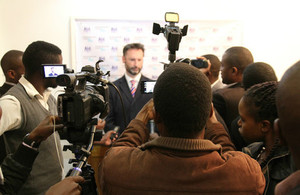'We need to be bolder on our agenda to fight corruption'
British High Commissioner, Michael Nevin, outlines ten recommendations in the fight against corruption in Malawi.

Michael Nevin addressing the press
On 12 May, Prime Minister David Cameron hosted the first ever Anti-Corruption Summit. The Summit recognised that corruption is a global issue with no country immune or without responsibilities. The Summit set out to galvanise international efforts to expose corruption, punish those involved and drive out a culture of corruption. G20 countries in particular recognised the need to do more in their own backyards.
The Summit made historic agreements, including increased transparency of beneficial owners of companies; sharing tax information to deter evasion; exposing lawyers, real estate agents and accountants who facilitate corruption; tracking down stolen assets; and launching a new Anti Corruption Coordination Centre. There was a strong recognition too of the importance of international co-operation, particularly helping developing countries in a co-ordinated effort.
Malawians are among the victims of corruption, fraud and theft. They can cite many examples - the corrupt theft of funds from government accounts, the theft of drugs, inflated or non-existent procurement contracts, ghost workers, dishonest claims by office-holders for rental refunds and bogus allowances claims by public servants. “Well wishers” can sometimes be a misnomer for shady cartels out for mutual self-enrichment.
“State security” excuses are also sometimes used as a convenient cover for self-enrichment. In one case the cost of transporting security equipment was so inflated, it would have been cheaper to give each piece its own first class seat on an airplane!
No matter the method, the impact is the same on Malawians. Various percentages are quoted, but they all amount to significant losses from the Malawi public purse - money which could have supported self-development and reduced the need for aid.
The cancer of corruption has sadly spread since I was lasted posted here. Many of the governance indicators show a downward trend. Malawians complain they cannot get a service without hearing “zam’manja?” Malawi risks heading down a dangerous road, as the worrying failure to bring to justice the murderers of Issa Njauju perhaps attests to.
There has been some progress. We should not underestimate the achievements of the Director of Public Prosecutions and the ACB in prosecuting those involved in “Cashgate”. There are signs of long over-due tougher action against Malawian officials involved in fraud and theft. President Mutharika has been clear that he will take action against any of his officials and close advisers suspected of corruption.
While President Mutharika sets the tone and the resolve through his words and actions, it is not his responsibility alone. Officials, elected representatives, business owners, civil society, the international community and the public all need to play their part. We need to be bolder on this agenda to reverse Malawi’s fortunes. Perhaps the following ten actions are worth considering?
-
a genuine zero-tolerance approach that lowers the bar for firing officials and their advisers (e.g. through the civil service and parliamentary codes, a more robust judicial services commission) with greater emphasis on ethical behaviour expectations and performance
-
increasing prevention by enforcing performance management systems and sanctions for not implementing audit recommendations
-
blending criminal and civil legal procedures in a more strategic approach to attacking those involved in corruption
-
transparent tendering of all government contracts, including of security equipment, with measures to prevent “insider trading” and conflicts of interest
-
greater investigative use of assets declarations and of “explanation of wealth” provisions in the Corrupt Practices Act, including assets overseas
-
blacklisting from any government contract those companies suspected of past or present improper conduct; and refusing to accede to their payment claims for alleged work done;
-
providing adequate funding to and up-skilling of the investigating, prosecuting and judicial authorities and the Financial Intelligence Unit, while changing a culture which prevents much better coordination and collaboration among them and the Malawi Revenue Authority;
-
strengthening and updating the Corrupt Practices and Anti-Money Laundering Acts, and passing an amended Political Parties Registration and Regulation Act
-
to avoid accusations of political interference, whether legitimate or not, strengthen institutional independence, of the ACB, the DPP and the Auditor-General in particular, taking them out of formal or informal executive management oversight (creating perhaps an equivalent of the UK’s independent Crown Prosecution Service) and checking executive powers of appointment and dismissal;
-
providing the means and confidence for citizens, including through technology, to expose, report and monitor follow-up to corruption.
There is not one magic solution to boost Malawi’s development. But the strategic impact of measures to prevent fraud, theft and corruption would be significant. We recognise in the UK that we need to be bolder to do better. And that we need to work together globally. Malawi can be bold too, as part of a greater national and international effort.